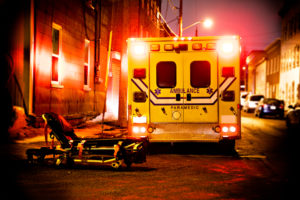In Hintz v. Farmers Co-op Ass’n., (297 Neb. 903) the Nebraska Supreme Court faced this question.
In this case, Ian Hintz (“Hintz”) was working at Farmers Cooperative Association (“Farmers”) as a tire technician and was repairing a tire on a semitrailer when the tire exploded. Hintz was injured when he was thrown about ten feet and landed on his back. He was in pain, and left work, not to return for three days. He returned to work on Monday, and did not seek medical attention.
About three weeks later Hintz was in his home when he fell on the stairs and hurt his hip. Hintz went to a doctor (‘Dr. Gallentine”) immediately and was found to have a labral tear. His injuries were severe, and he was referred to a specialist (“Dr. Harris”) and was told by his doctor to stay away from work as he recovered. When he went to that doctor, Hintz said that he had hurt himself, and it was not work-related.
February 25, 2015, Dr. Harris operated on Hintz to repair his hip. He told him to stay off work for six weeks and to go to physical therapy. In March of 2015, Farmers terminated Hintz, considering he had not been to work since the previous December. Within days of his firing, Hintz had a follow-up appointment with Dr. Harris, where he said (for the first time) that his injury was caused by the tire blowing up at work.
In May of 2015, Dr. Harris wrote a letter to Hintz’s counsel, talking about his injury, pointing out that initially, Hintz said that the injury was caused by something that happened at home. Dr. Harris said that there was reason to believe that Hintz’s later statement—that the injury was from the tire explosion in November—but he admitted the original paperwork from Hintz had conflicting report of how he was injured.
The same day, Dr. Gallentine wrote a letter to Hintz’s attorney discussing the cause of Hintz’s injury. Dr. Gallentine said it was difficult to assign causation to one event versus the other in the case of Hintz’s injury. He said Hintz could have hip pain and labral pathology from the injury at work on November 13th at work. He could also have similar findings from the fall at home in December. Dr. Gallentine said that there can be little certainty that would specifically assign his injury to one event versus another.
After hearing Hintz’s petition for disability benefits, the Workers’ Compensation Court denied him workers’ compensation benefits. The court said that his November injury at work was resolved within three days. Dr. Dennis Bozarth (“Dr. Bozarth”) is the doctor who was asked by Farmers to look at Hintz’s medical records. After reviewing medical records, Dr. Bozarth said that he thought the injury at work resolved after three days, and that the serious hip injury that required surgery was likely caused by the fall at home.
The appeals court found that the Workers’ Compensation Court erred in finding there was no medical basis for Hintz’s claim his injury was caused by the tire explosion. The Nebraska Workers’ Compensation Act provides that when an employee suffers an injury caused by an action that happened at work, he shall be compensated. The claimant has the burden of proving by a preponderance of the evidence that the injury happened in the normal course of work. The claimant must also provide expert medical testimony showing a causal relationship between the injury and the claimed disability.
Here, the Workers’ Compensation Court looked at the expert medical opinions of three orthopedic doctors and noting the conflicting evidence. Dr. Harris said it could be either injury. Dr. Bozarth said it could only be the fall at home. Dr. Gallentine said it could be either injury. Where the record presents nothing but conflicting opinions, it is up to the finder of fact to use its judgment.
The Court of Appeals made a mistake when it concluded Dr. Bozarth’s opinion was not competent because he simply reviewed medical records. The facts were in dispute as to whether Hintz fully recovered from the workplace accident. The Workers’ Compensation Court was not wrong in finding that Hintz did not meet his burden of proving his subsequent injury was a result of his workplace accident. The Nebraska Supreme Court therefore, reverses the holding of the Court of Appeals and remand the case to affirm the decision of the Workers’ Compensation Court.
The Metier Law Firm is committed to assisting people with personal injury claims throughout Colorado, Wyoming and Nebraska, and we frequently serve as co-counsel to law firms nationwide. Tom Metier recently secured the largest personal injury verdict in Colorado

Nationally recognized litigation attorney Thomas Metier practice areas include traumatic brain injuries, spinal cord injuries, trucking accidents and motor vehicle accidents. He is licensed to practice in Colorado, Wyoming, the U.S. District Court–District of Colorado, and the U.S. District Court–District of Wyoming, the 10th Circuit Court of Appeals and the U.S. Supreme Court.













Comments for this article are closed.